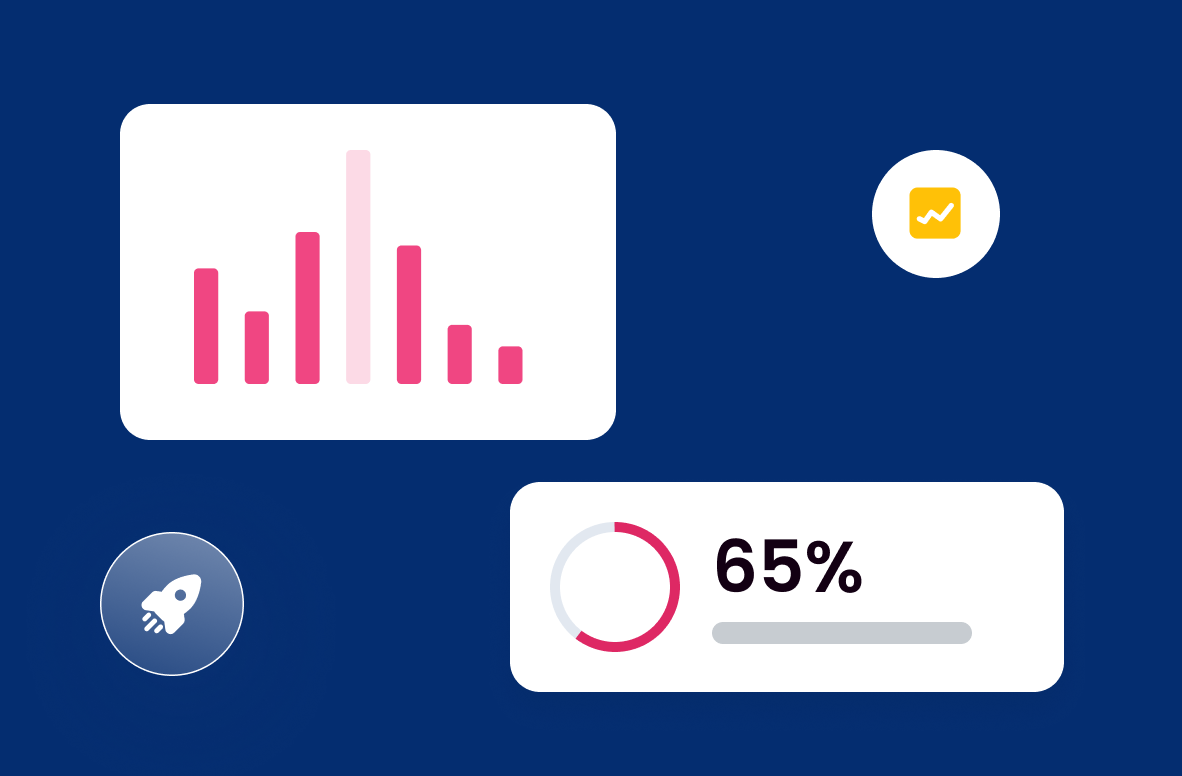TL;DR
Stop wasting time on folder-diving and dead-end searches. Here are 16 enterprise search platforms that use AI to deliver relevant knowledge and actionable insights so your teams find what matters, fast.
Especially if you’re working to create a centralized knowledge base that your teams will actually use.
From semantic search to natural language processing and real-time relevance, these tools go beyond file lookup to support smarter, faster decisions.
Why enterprise search needs to move beyond “file search” in 2026
Most legacy tools treat enterprise search like a file hunt. You enter a few keywords and hope for the right PDF. But today’s teams need relevant answers, not just matching filenames.
Legacy pain points
Older platforms often come with:
- Keyword-only search that misses context
- Limited formats like PDFs and Word docs
- No support for video, transcripts, or dashboards
- Irrelevant results and clunky filters
- Siloed content across internal systems
These issues waste time, duplicate work, and bury insights your teams could be using.
What modern enterprise search should deliver
A modern enterprise search platform is built for speed, context, and scale. It should:
- Use AI-powered semantic search to understand meaning, not just match terms
- Support structured and unstructured content, from decks to dashboards
- Offer natural language processing for real, conversational queries
- Deliver personalized, relevant results based on user behavior
- Connect to all your tools like Slack, Teams, Google Workspace, and more
These capabilities move beyond basic lookup and into true knowledge discovery.
Business impact: faster decisions, fewer risks
Modern search drives results:
- Less time spent searching
- Better reuse of existing knowledge
- Fewer duplicate projects
- Faster, more informed decisions
Now that we’ve defined what great search looks like, let’s talk about how to evaluate the right platform for your team.
What to look for in an enterprise search solution in 2026
Choosing the right enterprise search software means knowing what actually drives value, not just features for the sake of features.
Here’s what to prioritize.

Smarter search experiences
The best enterprise search tools go beyond basic keywords. They use:
- AI-powered semantic search to understand intent and context
- Natural language support for real questions and commands
- Machine learning capabilities that improve relevance over time
- Personalized results based on user behavior and roles
- Support for multilingual search, typo tolerance, and voice queries
These features power a more intuitive, flexible, and relevant search experience.
Broad content and system coverage
Modern search platforms should index everything, not just Word docs. Look for tools that support:
- Structured and unstructured content: PDFs, dashboards, videos, audio, slides
- Multiple data sources: internal documents, knowledge bases, CRMs, intranets
- Data connectors for SharePoint, Google Workspace, Slack, and third-party systems
- Unified indexing to eliminate silos and create one source of truth
Comprehensive coverage makes it easier for employees to find what they need, when they need it. For a broader framework, explore how integrations support a connected knowledge management framework.
Governance, analytics, and adoption
Security and usability aren’t nice-to-haves—they’re non-negotiable. Look for:
- Enterprise-grade data security, access controls, and compliance (e.g., ISO 27001, GDPR)
- Built-in search analytics to track usage, content gaps, and ROI
- Clean, easy-to-use interfaces with smart filters and search bar UX
- High adoption without long onboarding or IT-heavy rollouts
These features help you build a secure, scalable foundation for smarter AI knowledge management.
Now that you know what to look for, let’s dive into the top enterprise search software platforms leading the way in 2026.
The 16 best enterprise search software platforms for 2026
In this enterprise search tools comparison, we'll help you choose the best enterprise search tool for your organization.
AI-driven, insight-centric enterprise search
1. Stravito

Best for: Global enterprise teams that need semantic, AI-powered insight discovery across research, reports, and media, not just documents.
Stravito is a purpose-built enterprise search platform designed for consumer insights, UX research, and strategy teams. It enables fast, intuitive access to insights across multiple data sources and content formats, helping large organizations activate knowledge at scale.
Key features:
- AI-powered semantic search with multilingual and natural language support
- Conversational search experience with instant summaries and follow-up questions
- Personalized relevance based on user behavior and search queries
- Auto-tagging and classification using machine learning and a unified index
- Editorial tools that turn internal documents into curated insight packages
- Enterprise AI search assistant to surface, summarize, and share knowledge
Supported formats and integrations:
- Supports structured and unstructured content: PDFs, decks, dashboards, transcripts, videos, and images
- Integrates with Google Workspace, SharePoint, Slack, Teams, and external research feeds (e.g., Mintel, Kantar)
- Works with cloud and internal systems using robust data connectors
Standout use cases:
- Heineken uses Stravito’s generative AI assistant to scale insights across teams
- Electrolux, Shell, Delta, Coles, and GSK use Stravito to centralize insights and reduce knowledge loss
- Stravito users report up to 60% faster time-to-insight compared to legacy portals
Be sure to check out all our customer case studies to see how businesses like yours use Stravito.
Why it stands out:
Stravito is the only vertical enterprise search software solution focused entirely on insight and research workflows. It requires no IT project to deploy, supports fast onboarding, and is designed for high usage across global business teams.
Request a demo to see how Stravito helps teams find what matters, fast.
2. Coveo

Coveo is an AI-powered enterprise search platform built for personalized search across digital experiences.
Best for: E-commerce, support, and workplace search where behavior-based ranking matters.
Limitations: Requires technical resources to fully customize and deploy at scale.
3. Sinequa

Sinequa offers multilingual, AI-powered search and analytics for enterprises managing complex, regulated content.
Best for: Large organizations in pharma, finance, and legal with high compliance requirements.
Limitations: Requires significant setup and internal IT resources.
4. Mindbreeze

Mindbreeze provides enterprise AI search and visual dashboards to explore relationships across business data.
Best for: Enterprises in finance, pharma, or manufacturing with siloed content systems.
Limitations: Customization may require technical support, especially in hybrid environments.
5. SearchUnify

SearchUnify delivers AI-driven search and chat for customer support and self-service use cases.
Best for: Support and success teams managing knowledge bases, CRMs, and communities.
Limitations: Not designed for full enterprise-wide knowledge discovery.
6. Akooda (now Tulip)

Akooda (now Tulip) is a lightweight search platform for SaaS teams that need fast, AI-based search across cloud tools.
Best for: Digital-native teams working across Slack, Notion, and Google Workspace.
Limitations: Not suitable for legacy systems or on-prem environments.
Category: Developer-first and customizable enterprise search engines
These enterprise custom search tools are ideal for IT-led teams that want flexibility and control.
7. Lucidworks Fusion

Lucidworks Fusion is a flexible, AI-powered enterprise search platform built on Apache Solr.
Best for: Enterprises needing full control over indexing, ranking, and data pipelines.
Limitations: Requires technical expertise for deployment and ongoing maintenance.
8. Algolia Enterprise

Algolia delivers ultra-fast, API-first search for digital product teams.
Best for: Real-time search in web apps, e-commerce sites, and SaaS tools.
Limitations: Not optimized for enterprise knowledge discovery or internal document search.
9. IBM Watson Discovery

IBM Watson Discovery uses AI and NLP to extract insights from unstructured enterprise content.
Best for: Technical or regulated industries needing advanced document understanding.
Limitations: Requires configuration and internal AI expertise to deploy effectively.
10. Elastic Enterprise Search

Elastic Enterprise Search is a scalable, open source platform for building customized search experiences.
Best for: IT teams looking for control, transparency, and open source extensibility.
Limitations: Complex to configure and maintain without dedicated engineering support.
11. Yext Knowledge Graph

Yext Knowledge Graph provides a knowledge graph–driven search platform for digital and support use cases.
Best for: Marketing, web, and help center search across structured website content.
Limitations: Lacks support for deep research workflows or internal document repositories.
Category: Intranet-style or horizontal knowledge platforms
12. Google Agentspace (Google Cloud Search)

Google Cloud Search offers unified search across Google Workspace apps and internal data.
Best for: Organizations fully integrated with Gmail, Drive, Docs, and other Google tools.
Limitations: Limited support for non-Google platforms or external knowledge systems.
13. BA Insight

BA Insight extends existing platforms like SharePoint with connectors and AI to unify search across silos.
Best for: Enterprises with legacy repositories or compliance needs across complex systems.
Limitations: Functions best as an enhancement layer, not a standalone platform.
14. AddSearch

AddSearch is a lightweight, API-based tool for site search and internal portals.
Best for: Fast, simple deployments for websites or intranets.
Limitations: Lacks advanced AI features and deep enterprise integrations.
15. Guru

Guru delivers team-friendly search through Slack and browser extensions for internal knowledge sharing.
Best for: Small to mid-sized teams centralizing FAQs, playbooks, and policies.
Limitations: Not built for enterprise-wide indexing or cross-platform search.
16. LucidLink

LucidLink offers cloud-native file streaming with search across large media repositories.
Best for: Creative and distributed teams working with video, design, and large files.
Limitations: Not designed for semantic or AI-powered enterprise knowledge search.With so many enterprise search software options available, choosing the right one depends on your team’s needs, workflows, and content complexity.
But if your goal is to activate insights and not just find files, one platform stands out.
Let’s take a closer look at why Stravito leads the way in AI-powered enterprise search for insights.
Why Stravito leads in AI-powered enterprise search for insights
Stravito isn’t a generic enterprise search platform with research tacked on. It’s a purpose-built solution for consumer insights, UX research, and strategy teams that need fast, intuitive access to knowledge.
Now, they don't have to rely on IT, folder hierarchies, or guesswork.
Unlike traditional file search tools or repurposed knowledge bases, Stravito is designed to help global organizations unlock the full value of their internal research.
It supports true knowledge discovery across decks, dashboards, video, transcripts, and third-party sources like Mintel and Kantar.

What makes Stravito different:
- Built with semantic search and natural language processing, so users can ask real questions and get relevant, ranked results instantly
- Surfaces insights from structured and unstructured content, including PDFs, video, dashboards, and research portals
- Offers a clean, conversational search interface that’s accessible to any stakeholder, not just research specialists
- Delivers personalized search results based on user behavior and access level
- Provides a unified index across SharePoint, Slack, Google Workspace, Teams, and external research providers
- Automatically tags and categorizes content, drastically reducing manual effort
- Includes built-in tools to create curated knowledge packages for sharing and activation
Unlike platforms that require custom builds or months-long onboarding, Stravito is fully deployable out of the box with no IT project required. Most teams are up and running in weeks, not quarters.
Stravito isn’t just fast to deploy. It’s fast to value. Insights teams at companies like Heineken, Electrolux, Shell, and Coles have used it to cut time-to-insight by up to 60%, reduce duplicate research, and improve visibility across global teams.
If you’re investing in AI knowledge management that actually drives usage, Stravito delivers. It’s more than a search tool. It’s how insights power better decisions.
Request a demo to see how Stravito helps your teams find what matters fast.
Over to you: Choose smarter, not harder
Enterprise search is a team investment. The right platform won’t just help your teams find files. It will unlock the insights they already have, reduce time spent answering the same questions, and fuel faster, better decisions.
Whether you’re centralizing research across markets, scaling knowledge sharing globally, or simply tired of hearing “I couldn’t find it,” the tools in this guide give you a solid place to start.
But if you’re looking for a purpose-built platform that’s actually designed for insights and not just storage, Stravito stands apart.
Request a demo and see how enterprise search becomes insight activation.
FAQs
1. What is enterprise search software?
Enterprise search software helps employees search across internal company information, like documents, emails, dashboards, and wikis, from one place. A modern enterprise search engine uses artificial intelligence and semantic understanding to deliver fast, relevant results across structured and unstructured content.
2. How is AI changing enterprise search tools?
AI-powered enterprise search tools can now understand natural language search queries, personalize results based on user behavior, and surface insights. Features like semantic search, auto-tagging, and search analytics make workplace search faster, smarter, and more useful.
3. What formats should enterprise search solutions support?
The best enterprise search platforms support a wide range of formats, including PDFs, decks, images, audio, video, and dashboards.
They also index data from file storage systems, CRMs, intranets, and external feeds, providing a unified view of your knowledge across multiple data sources.
4. Can enterprise search tools work across cloud and on-prem systems?
Yes. Many enterprise search software options support hybrid environments, connecting cloud apps like Google Workspace with on-prem systems like SharePoint or internal databases.
Some also include support for vector database architecture to enable smarter indexing and retrieval.
5. What’s the difference between internal enterprise search and site search?
Internal enterprise search focuses on helping employees search internal data: research, policies, meeting notes, and more. Site search (or customer-facing search) is built for public websites, product catalogs, and help centers.
Some platforms offer both, but internal search has unique needs like privacy controls, usage tracking, and knowledge discovery across departments.
6. How do search analytics improve enterprise search performance?
Search analytics track what employees search for, which results they click, and where they run into dead ends. These insights help teams refine content, improve search capabilities, and ensure relevant information is easy to find, especially in fast-moving enterprise environments.




